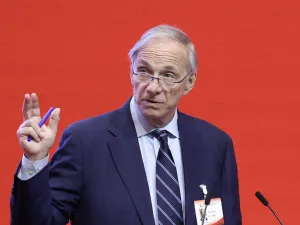Every spring, JPMorgan Chase (JPM) CEO Jamie Dimon pens a letter to shareholders to reflect on the bank’s business in the past year and share his thoughts on the most pressing economic issues concerning business leaders. In this year’s shareholder letter, published yesterday (April 8), Dimon dedicated a section to the best management lessons gleaned from his nearly two decades of experience at the helm of the world’s largest bank. Here are the top takeaways:
Sign Up For Our Daily Newsletter
SIGN UP
Observe before act
Taking inspiration from military strategy, Dimon introduced the “OODA loop,” short for “Observe, Orient, Decide, Act—repeat,” as a decision-making approach. In light of the economic challenges faced by the U.S. and global economies in the past year, the CEO stressed the importance of observation before action. Part of Dimon’s own observation process is to “get on the road.” He wrote about his constant trips to JPMorgan’s operating centers, branches and call centers, meeting with regulators and government officials at all levels, and participating in client meetings.
In 2011, Dimon took his first bus tour from Seattle to San Diego, meeting with stakeholders at every level along the way. He has become famous for such bus tours since then, telling CNBC last August that he encourages economy observers to “leave California and New York, come visit Montana or Idaho” to get a better idea of how Americans are working and innovating.
Dimon noted that, during the decision-making process, crowd-sourcing intelligence is useful but should not get in the way of quickly making a good decision and executing it. “Often people spend too much time debating issues that are simply not that important; it’s better to decide and move on,” he wrote.
“Question everything.”
Dimon urged leaders to “shed sacred cows, seek out blind spots, and challenge the status quo.” Often people use their brains to justify existing biases rather than finding the objectively correct answer, he wrote, but beating this natural human instinct and engaging with naysayers to “seek out where they may be partially right” is crucial.
He believes that leaders should embrace curiosity in the “form of humility” by asking many questions and assuming they don’t know the correct answer. “Question everything,” he advised.
Think long-term
Dimon also introduced shareholders to his “future-back” mental model for long-term thinking. This approach involves envisioning various future scenarios, seeing how today’s potential and current events may cause them, and then working backward to identify the steps needed to achieve desired outcomes.
In his view, the focus on short-term metrics cloud people from seeing the bigger picture—for example, focusing on shrinking monthly inflation numbers rather than noticing that the enormous annual fiscal spending will be inflationary in the long term.
Lead with integrity
Finally, Dimon revealed his secret sauce of leadership: “Heart cannot be overstated.” Emphasizing the importance of earning trust and respect, Dimon wrote, “People need to know that even when you make mistakes, you’re willing to admit them and take corrective action…Good people want to work for people they respect, and they will not respect people who take all the credit and share all the blame.”
Leading by example, Dimon opened up about a mistake he made by outsourcing JPMorgan’s security guards as a cost-cutting measure, resulting in the same guards returning to work but with their healthcare benefits cut in half. Dimon eventually reversed the decision, writing, “JPMorgan Chase’s success will not be built off the backs of our guards—it will be the result of fair treatment of all of our employees.”





